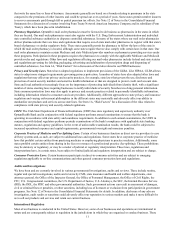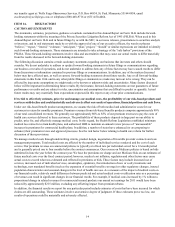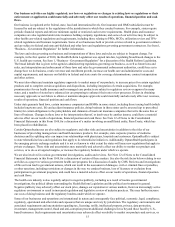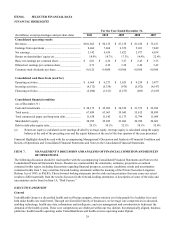United Healthcare 2011 Annual Report Download - page 22
Download and view the complete annual report
Please find page 22 of the 2011 United Healthcare annual report below. You can navigate through the pages in the report by either clicking on the pages listed below, or by using the keyword search tool below to find specific information within the annual report.20
could be subject to claims for breaches of fiduciary obligations or entering into certain prohibited transactions.
UnitedHealthcare Employer & Individual is transitioning pharmacy benefit management for approximately 12 million of its
commercial members, including pharmacy claims adjudication and customer service, from Medco Health Solutions, Inc. to
OptumRx beginning in 2013. If we are unable to execute the transition effectively, UnitedHealthcare Employer & Individual
could face loss of business, which could adversely impact our results of operations, financial position and cash flows.
If we fail to compete effectively to maintain or increase our market share, including maintaining or increasing
enrollments in businesses providing health benefits, our results of operations, financial position and cash flows could be
materially and adversely affected.
Our businesses compete throughout the United States and face significant competition in all of the geographic markets in which
we operate. We compete with other companies on the basis of many factors, including price of benefits offered and cost and
risk of alternatives, location and choice of health care providers, quality of customer service, comprehensiveness of coverage
offered, reputation for quality care, financial stability and diversity of product offerings. For our UnitedHealthcare reporting
segment, competitors include Aetna Inc., Cigna Corporation, Coventry Health Care, Inc., Health Net, Inc., Humana Inc., Kaiser
Permanente, WellPoint, Inc., numerous for-profit and not-for-profit organizations operating under licenses from the BlueCross
BlueShield Association and other enterprises that serve more limited geographic areas or market segments such as Medicare
and Medicaid specialty services. For our OptumRx business, competitors include Medco Health Solutions, Inc., CVS/Caremark
Corporation and Express Scripts, Inc. Our OptumHealth and OptumInsight reporting segments also compete with a broad and
diverse set of businesses.
In particular markets, competitors may have greater capabilities, resources or market share; a more established reputation;
superior supplier or health care professional arrangements; existing business relationships; or other factors that give such
competitors a competitive advantage. In addition, significant merger and acquisition activity has occurred in the industries in
which we operate, both as to our competitors and suppliers (including hospitals, physician groups and other care professionals)
in these industries. Consolidation may make it more difficult for us to retain or increase customers, to improve the terms on
which we do business with our suppliers, or to maintain or increase profitability. If we do not compete effectively in our
markets, if we set rates too high or too low in highly competitive markets, if we do not design and price our products properly
and competitively, if we are unable to innovate and deliver products and services that demonstrate value to our customers, if we
do not provide a satisfactory level of services, if membership or demand for other services does not increase as we expect, if
membership or demand for other services declines, or if we lose accounts with more profitable products while retaining or
increasing membership in accounts with less profitable products, our business, results of operations, financial position and
cash flows could be materially and adversely affected.
If we fail to develop and maintain satisfactory relationships with physicians, hospitals, and other health care providers,
our business could be materially and adversely affected.
We contract with physicians, hospitals, pharmaceutical benefit service providers, pharmaceutical manufacturers, and other
health care providers for services. Our results of operations and prospects are substantially dependent on our continued ability
to contract for these services at competitive prices. Failure to develop and maintain satisfactory relationships with health care
providers, whether in-network or out-of-network, could materially and adversely affect our business, results of operations,
financial position and cash flows.
In any particular market, physicians and health care providers could refuse to contract, demand higher payments, or take other
actions that could result in higher medical costs, less desirable products for customers or difficulty meeting regulatory or
accreditation requirements. In some markets, certain health care providers, particularly hospitals, physician/hospital
organizations or multi-specialty physician groups, may have significant market positions or near monopolies that could result in
diminished bargaining power on our part. In addition, physician or practice management companies, which aggregate physician
practices for administrative efficiency and marketing leverage, may compete directly with us. If these providers refuse to
contract with us, use their market position to negotiate favorable contracts or place us at a competitive disadvantage, our ability
to market products or to be profitable in those areas could be materially and adversely affected.
In addition, we have capitation arrangements with some physicians, hospitals and other health care providers. Under the typical
capitation arrangement, the health care provider receives a fixed percentage of premiums to cover all or a defined portion of the
medical costs provided to the capitated member. Under some capitated arrangements, the provider may also receive additional
compensation from risk sharing and other incentive arrangements. Capitation arrangements limit our exposure to the risk of
increasing medical costs, but expose us to risk related to the adequacy of the financial and medical care resources of the health
care provider. To the extent that a capitated health care provider organization faces financial difficulties or otherwise is unable
to perform its obligations under the capitation arrangement, we may be held responsible for unpaid health care claims that
should have been the responsibility of the capitated health care provider and for which we have already paid the provider under
the capitation arrangement. Further, payment or other disputes between a primary care provider and specialists with whom the
primary care provider contracts can result in a disruption in the provision of services to our members or a reduction in the
























